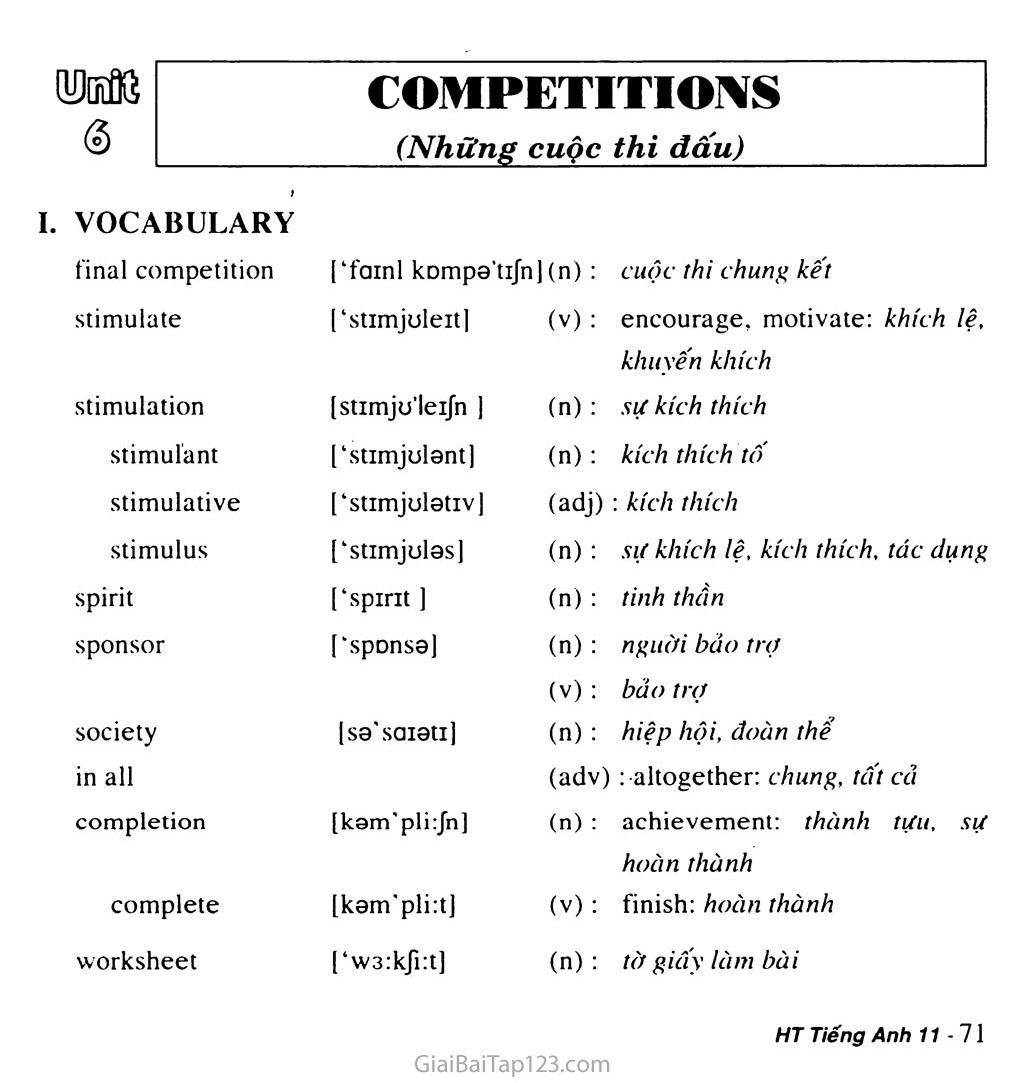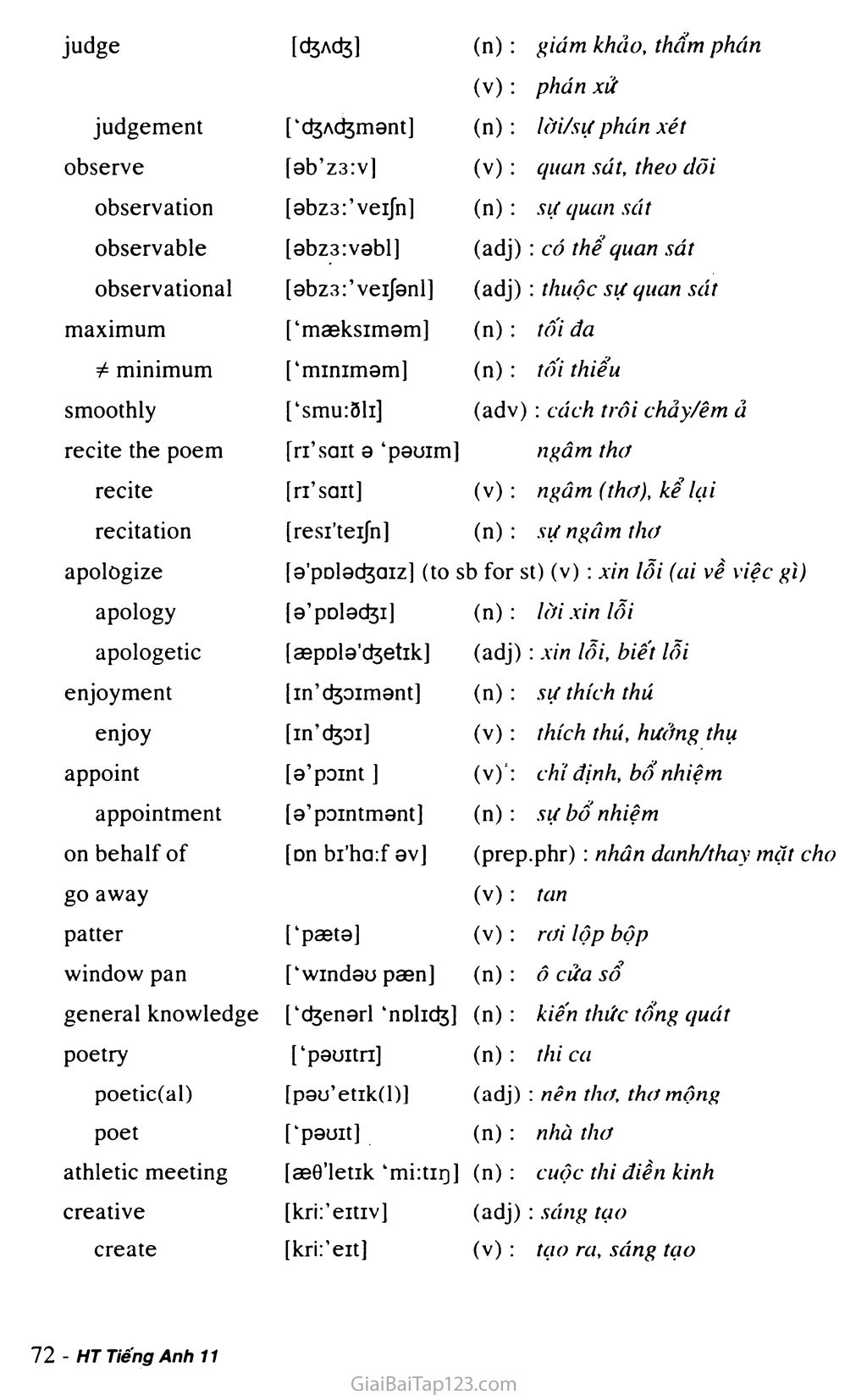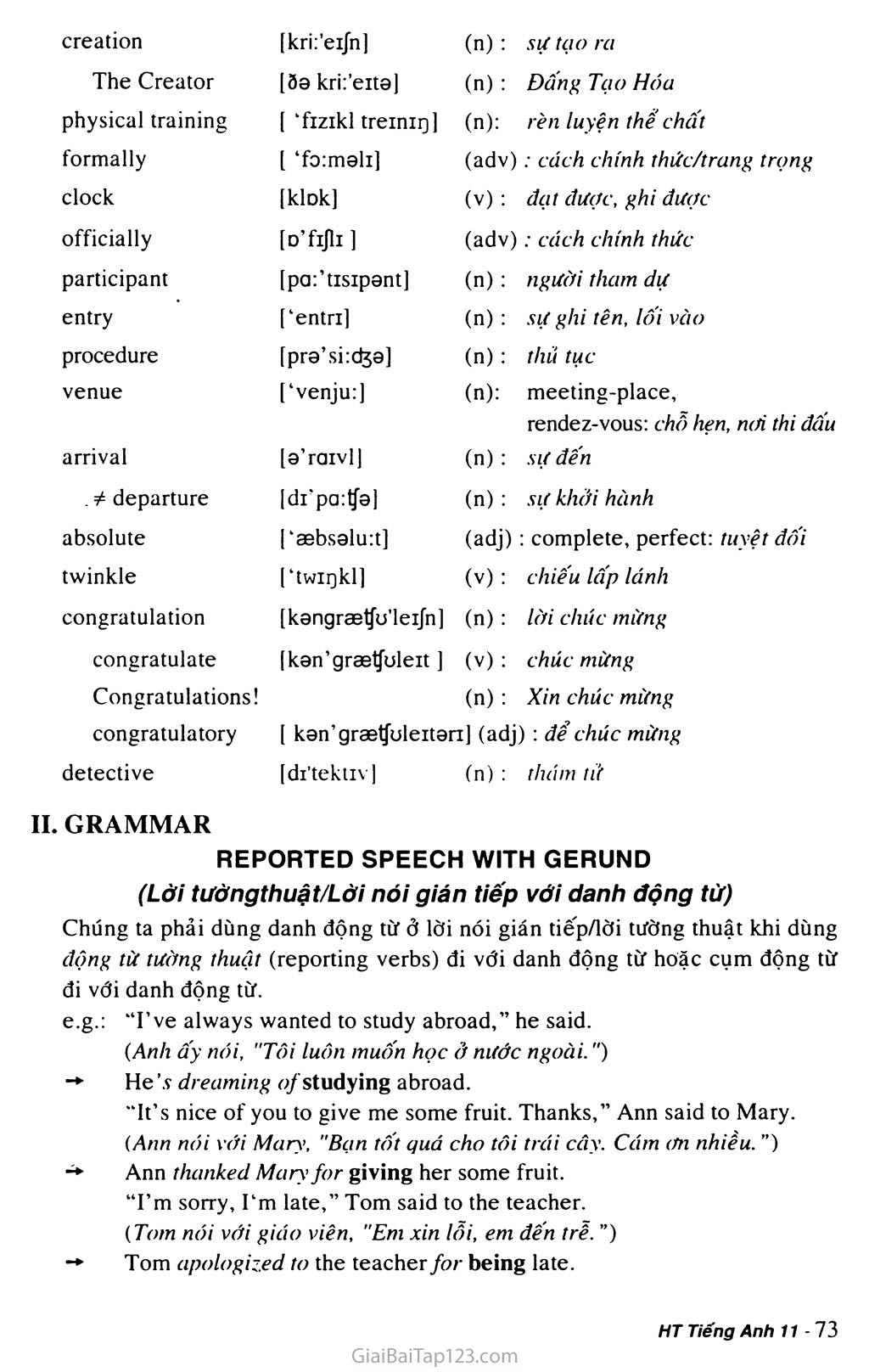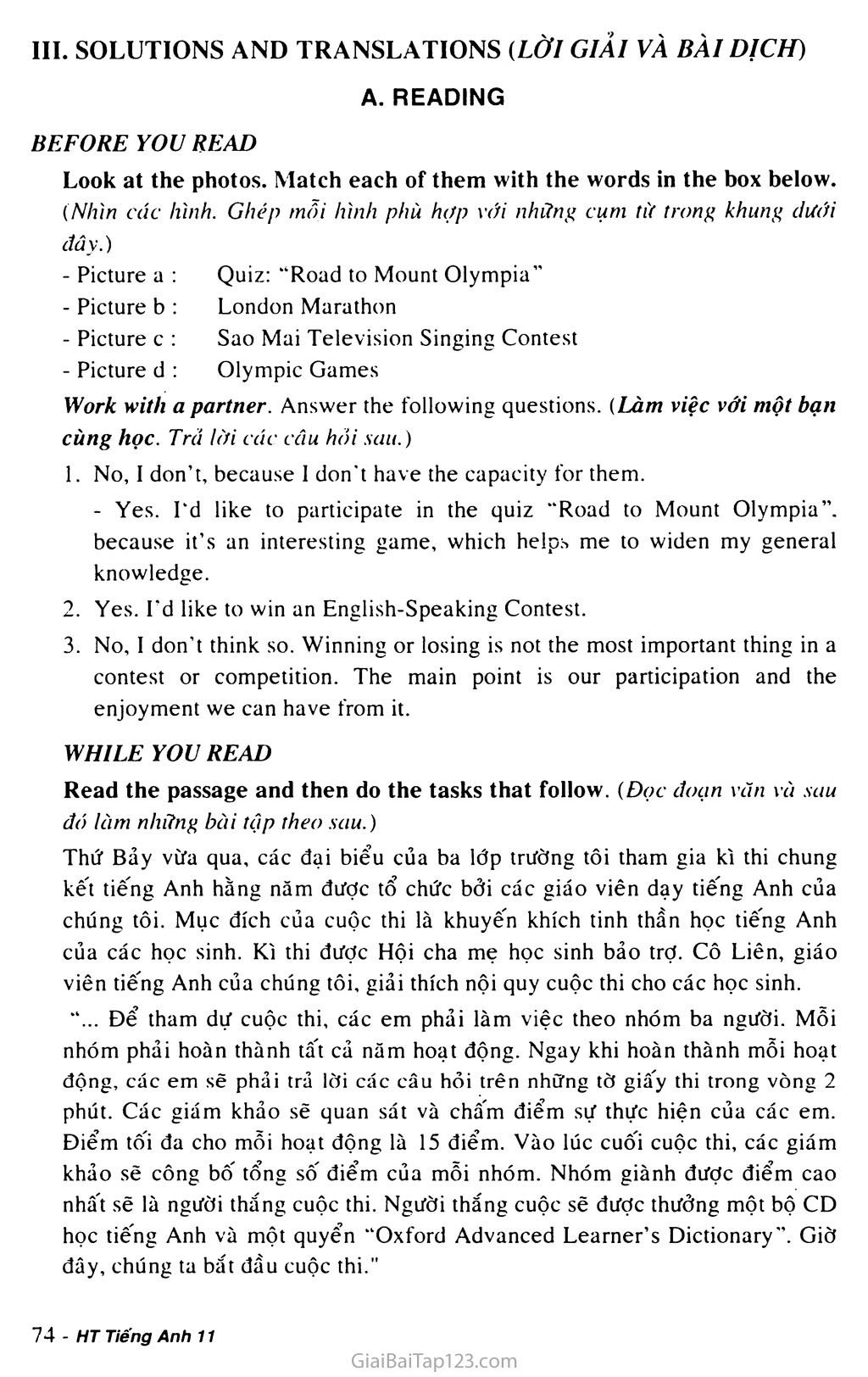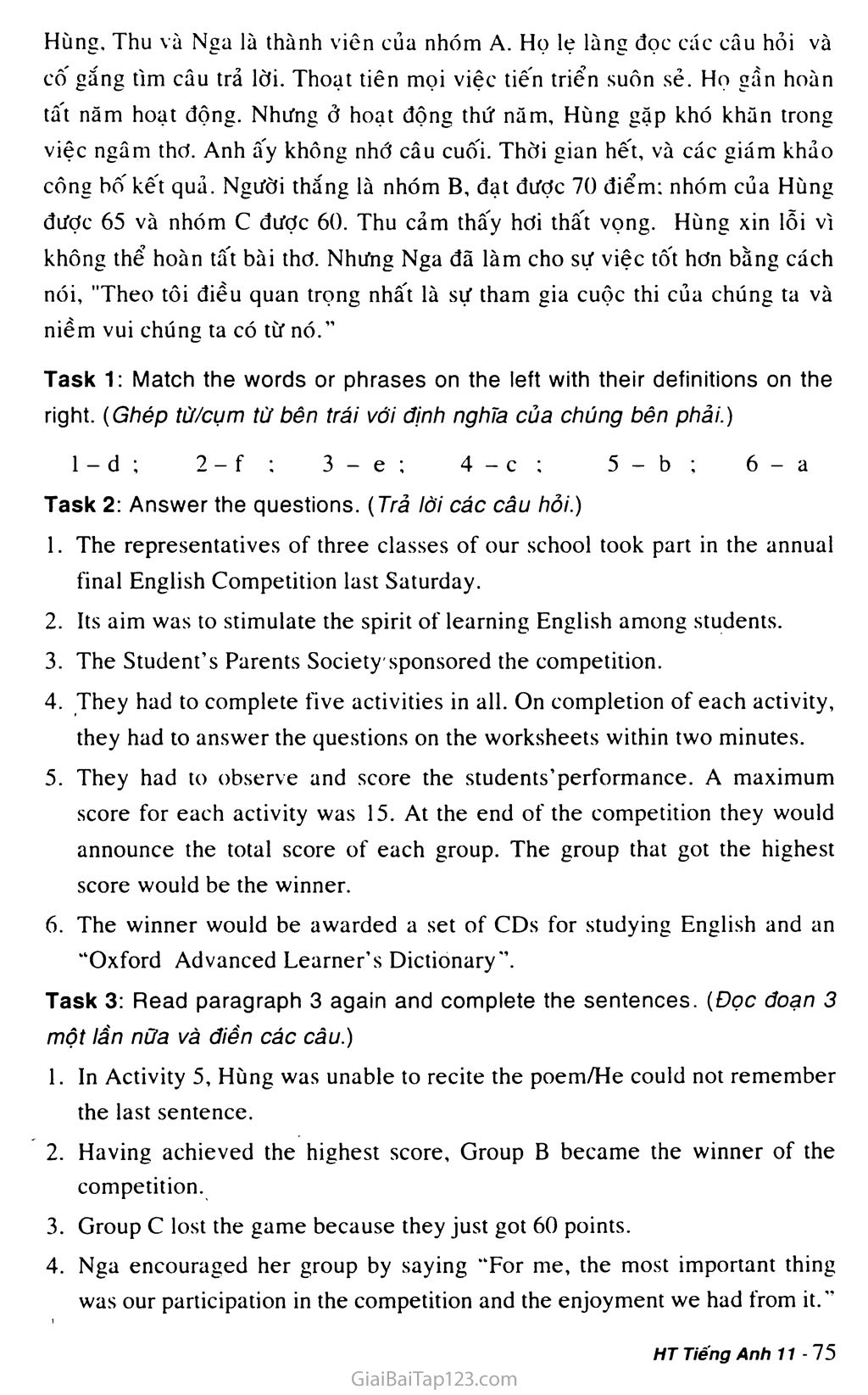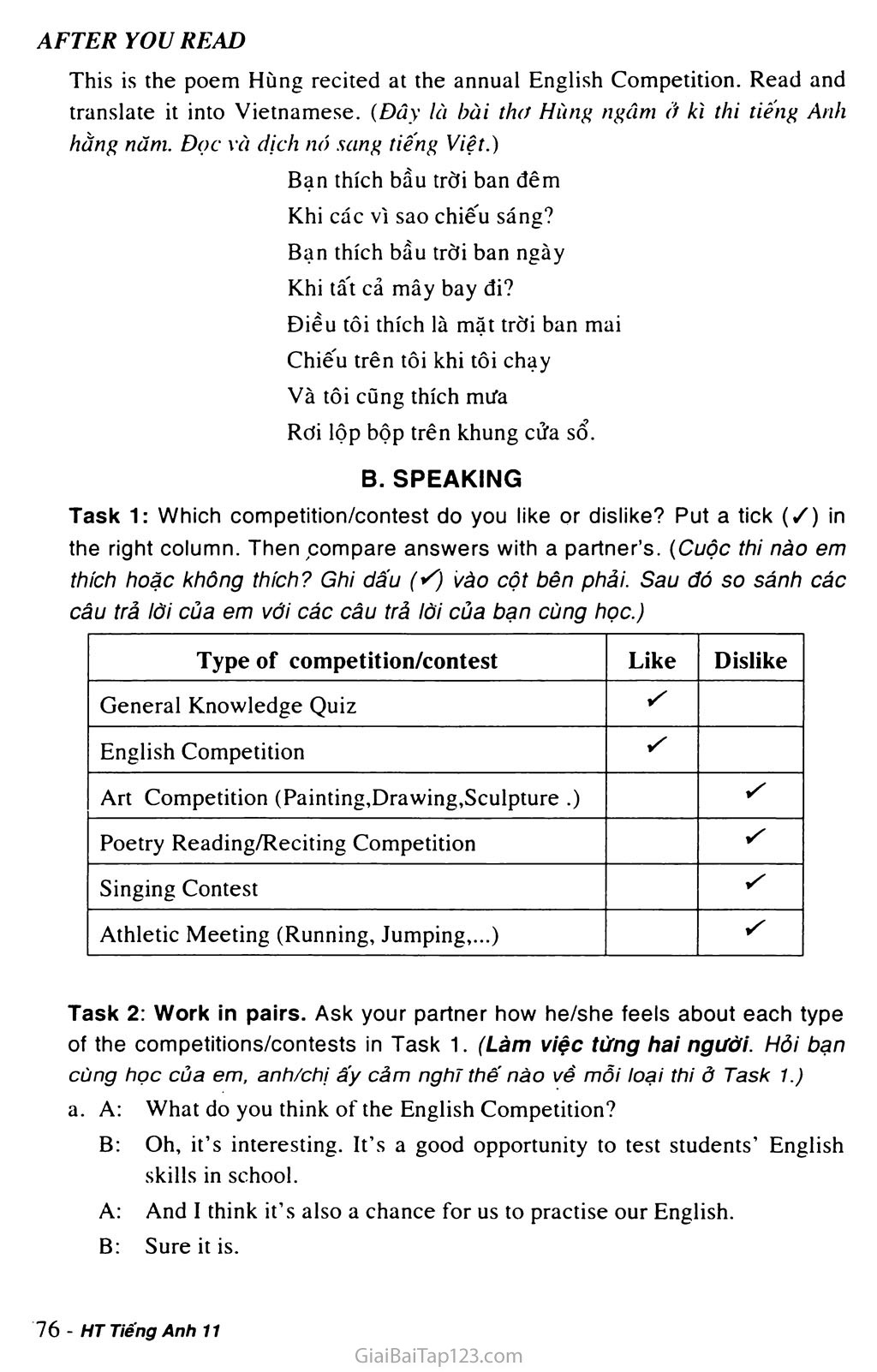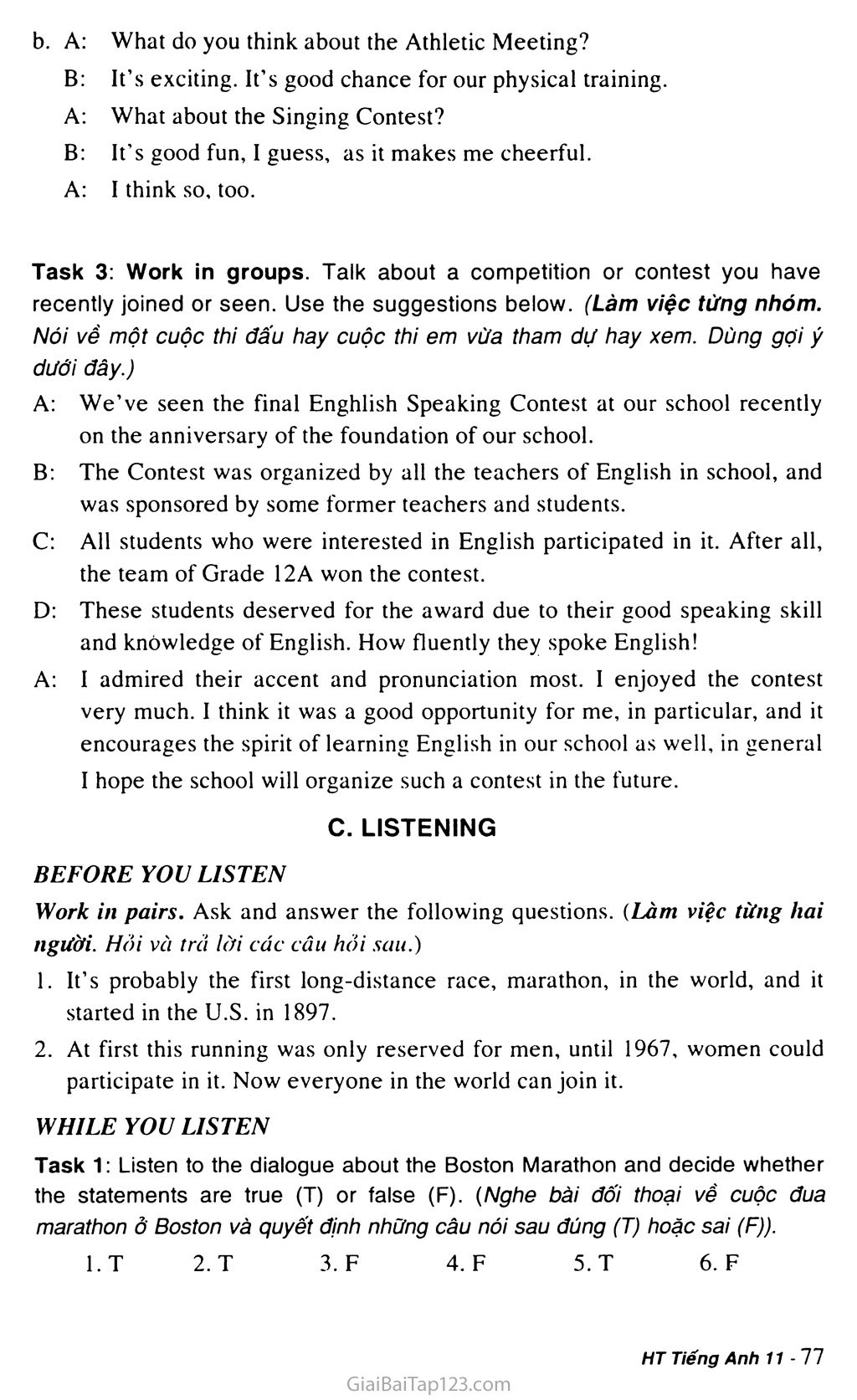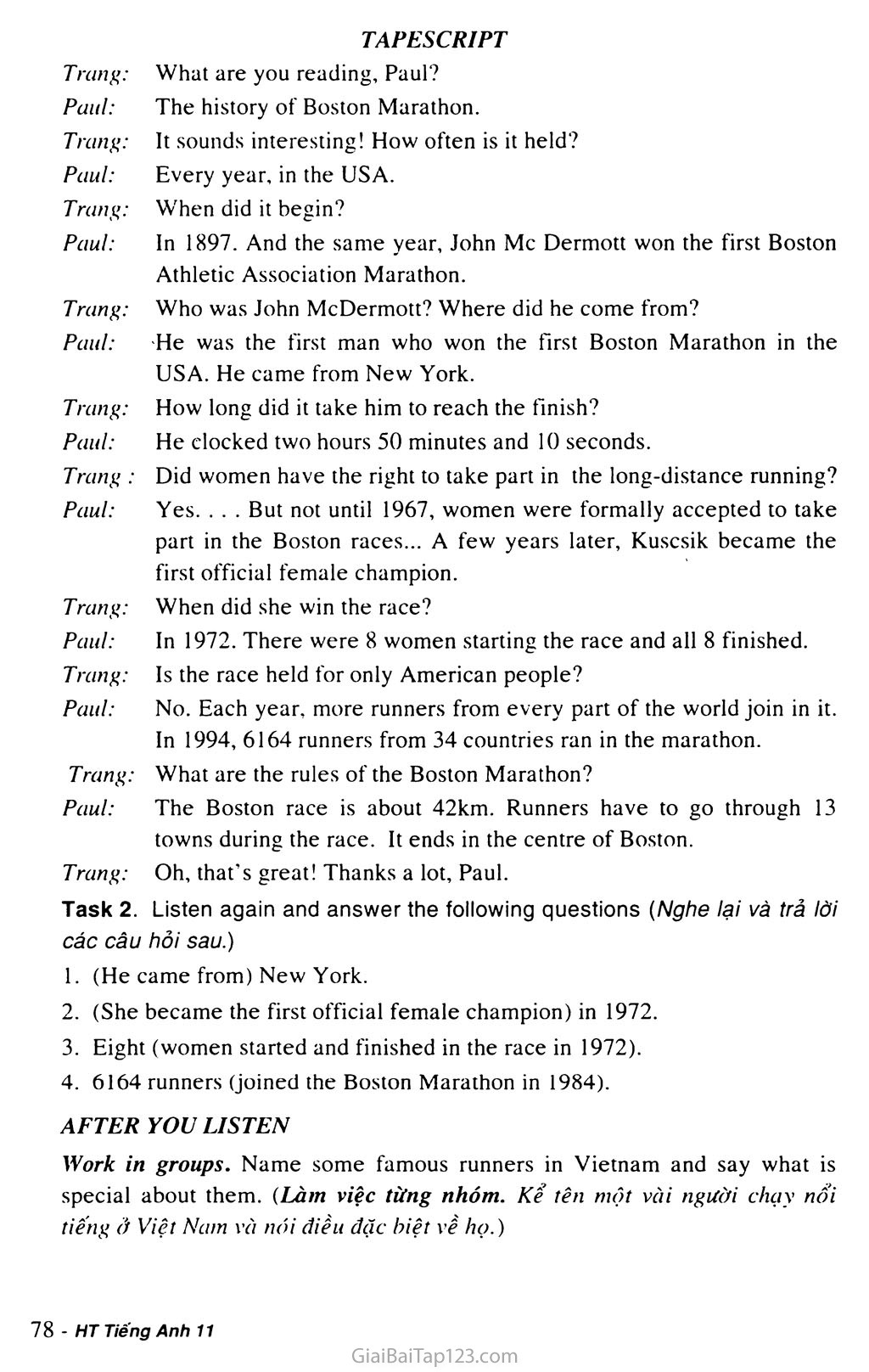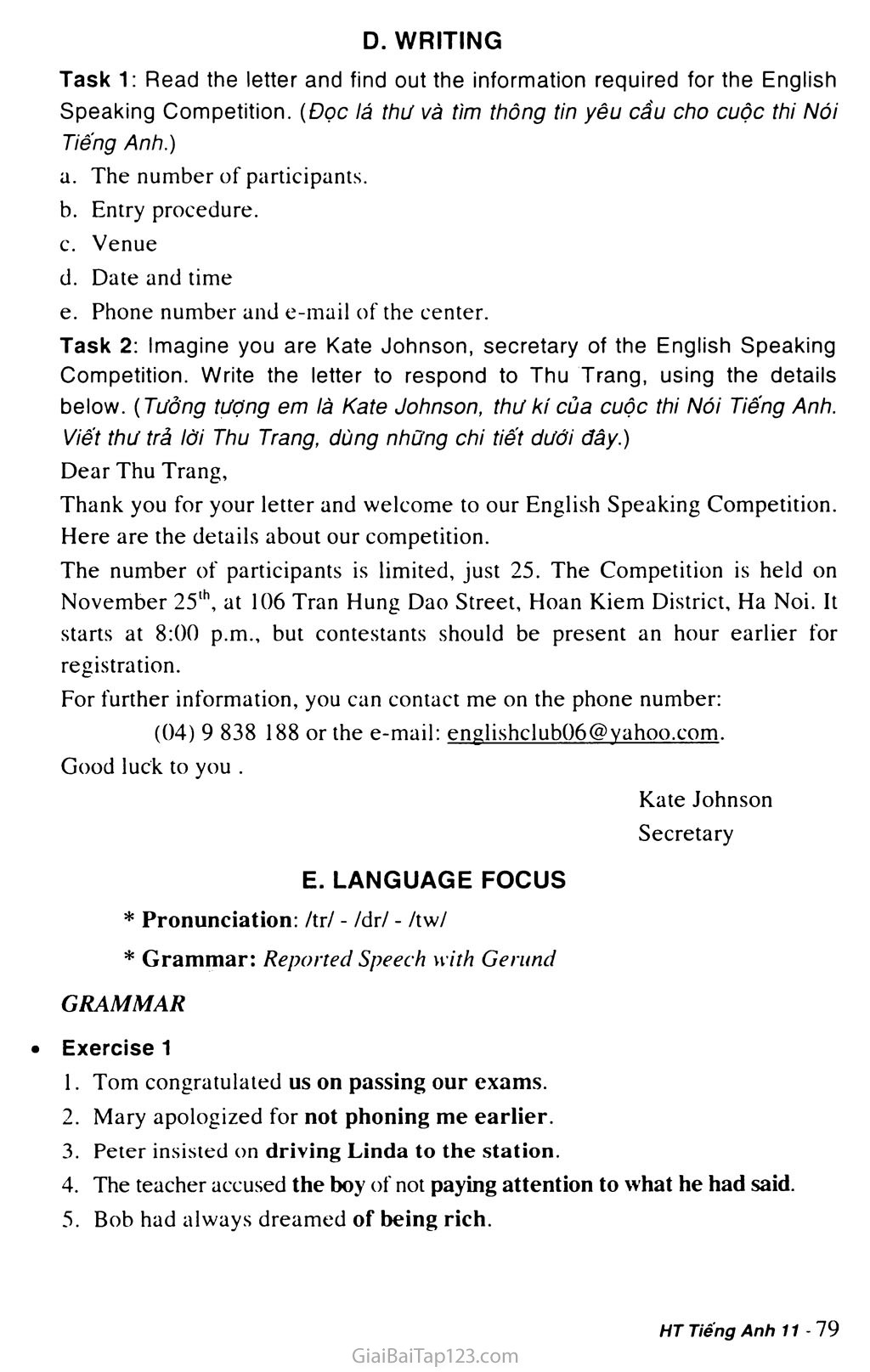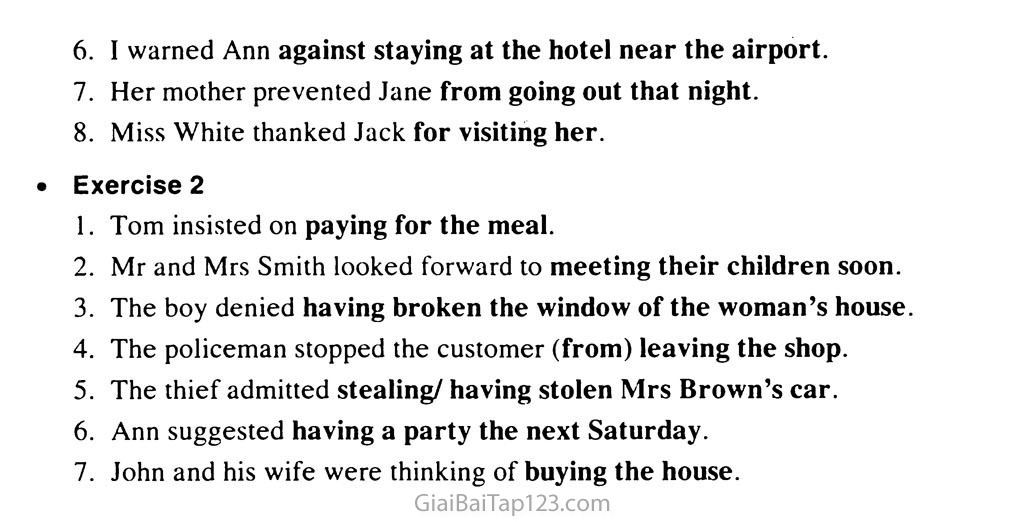Giải tiếng Anh lớp 11 Unit 6: COMPETITIONS
COMPETITIONS (Những cuộc thỉ dấu) VOCABULARY final competition 1‘fainl kDmpa'tiJn] (n) : cuộc thi chung kết stimulate 1‘stimjuleitl (V): encourage, motivate: khích lệ, khuyến khích stimulation [stimju'leijn 1 (n) : sự kích thích stimulant [‘stimjulantj (n): kích thích tố stimulative [‘stimjulativ) (adj) : kích thích stimulus [‘stimjulas] (n): sự khích lệ, kích thích, tác dụng spirit [‘spirit ] (n) : tinh thần sponsor [‘spDnsa] (n) : nguời bao trợ (V): bdo trợ society [sa'saiati] (n) : hiệp hội, đoàn thế in all (adv) : altogether: chung, tất cả completion [kam'plijn] (n) : achievement: thành tựu, sự hoàn thành complete [kam’pli:t] (V): finish: hoàn thành worksheet I‘w3:kfi:t] (n) : tờ giấy làm bùi judge [d3Ads] (n): (V): giám khảo, thẩm phán phán xử judgement ['d3Ad3mont] (n): lời/sự phán xét observe [eb’z3:v] (V): quan sút, theo dõi observation [obz3:’veijh] (n) : sự quan sút observable [9bz3:vsbl] (adj) : có thể quan sát observational [obzsr’veijonl] (adj) : thuộc sự quan sút maximum [‘maeksimom] (n): tối đa # minimum [‘minimsm] (n): tối thiểu smoothly [‘smu:3li] (adv) : cách trôi chảy/êm ả recite the poem fri’sait 9 ’pguim] ngâm thơ recite [ri’sait] (V): ngâm (thơ), kể lại recitation [resx’teijn] (n) : sự ngâm thơ apologize [9’pDl9d3aiz] (to sb for St) (v) : xin lỗi (ai về việc gì) apology [9’pDl9d3l] (n): lời xin lỗi apologetic [agpDlo’djetikJ (adj) : xin lỗi, biết lỗi enjoyment [in’dsoimgnt] (n) : sự thích thú enjoy [in'd3Oi] (V): thích thú, hưởng thụ appoint [9’point ] (V): chí định, bổ nhiệm appointment (a’pointmantj (n) : sự bổ nhiệm on behalf of [Dn bi’ha:f 9v] (prep.phr) : nhân danh/thay mặt cho go away (V): tan patter [‘paets] (V): rơi lộp bộp window pan [‘wind90 psen] (n) : ô cửa sổ general knowledge I‘d3en9rl ‘nDlidj] (n) : kiến thức tổng quát poetry [‘pguitri] (n): thi ca poetic(al) [pgu’etikd)] (adj) : : nên thơ, thơ mộng poet [p9UIt] (n) : nhà thơ athletic meeting [aeS’letik *mi:tiq] (n) : cuộc thi điền kinh creative [kri.’eitiv] (adj) : : sáng tạo create [kri:’eit] (V): tạo ra, sáng tạo creation [ krit’eifn] (n) : sự tạo ra The Creator [So krifeita] (n) : Đấng Tạo Hóa physical training [ ‘fizikl treinip) (n); rèn luyện thể chất formally [ ‘fo:mali] (adv) : cách chính thức/trang trọng clock [klDk] (V): dạt được, ghi được officially [D’fljll ] (adv) : cách chính thức participant [pa:’tisipant] (n) : người tham dự entry [‘entri] (n): sự ghi tên, lối vào procedure [pra’si:d3a] (n): thủ tục venue [‘venju:] (n); meeting-place, rendez-vous: chỗ hẹn, nơi thi đấu arrival [a’raivl] (n) : sự đến . # departure |dipa:tfa] (n) : sự khởi hành absolute [ ‘aebsaluit] (adj) : complete, perfect: tuyệt đối twinkle [’twipkl] (V): chiếu lấp lánh congratulation [kangrastfu’leijn] (n) : lời chúc mừng congratulate [kan’graetfuleit ] (V): chúc mừng Congratulations! (n) : Xin chúc mừng congratulatory [ kan’graetfuleitari] (adj) : để chúc mừng detective [dítektivỊ (n) : thám tử II. GRAMMAR REPORTED SPEECH WITH GERUND (Lời tườngthuật/Lời nói gián tiếp với danh động từ) Chúng ta phải dùng danh động từ ở lời nói gián tiếp/lời tường thuật khi dùng í/ộng từ tường thuật (reporting verbs) đi với danh động từ hoặc cụm động từ đi với danh động từ. e.g.: ‘Tve always wanted to study abroad,” he said. (Anh ấy nói, ''Tôi luôn muốn học ở nước ngoài.") -* He's dreaming of studying abroad. “It’s nice of you to give me some fruit. Thanks,” Ann said to Mary. (Ann nói với Mary, "Bạn tốt quá cho tôi trái cây. Cám ơn nhiều. ”) -* Ann thanked Mary for giving her some fruit. “I’m sorry, Tm late,” Tom said to the teacher. (Tom nói với giáo viên, "Em xin lỗi, em đến trễ. ”) -* Tom apologized to the teacher/or being late. III. SOLUTIONS AND TRANSLATIONS (LỜI GIẢI VÀ BÀI DỊCH) A. READING BEFORE YOU READ Look at the photos. Match each of them with the words in the box below. (Nlùn các lùnh. Ghép mỗi hình phù hợp với những cụm từ trong khung dưới dây.) Picture a : Quiz: “Road to Mount Olympia” Picture b : London Marathon Picture c : Sao Mai Television Singing Contest Picture d : Olympic Games Work with a partner. Answer the following questions. (Làm việc với một bạn cùng học. Tra lời các câu hdi sau.) No, I don’t, because 1 don't have the capacity for them. - Yes. I'd like to participate in the quiz "Road to Mount Olympia”, because it’s an interesting game, which helps me to widen my general knowledge. Yes. I’d like to win an English-Speaking Contest. No, 1 don’t think so. Winning or losing is not the most important thing in a contest or competition. The main point is our participation and the enjoyment we can have from it. WHILE YOU READ Read the passage and then do the tasks that follow. (Dọc đoạn văn và SUU đó làm những bài tập theo sau.) Thứ Bảy vừa qua, các đại biểu của ba lớp trường tôi tham gia kì thi chung kết tiếng Anh hằng năm được tổ chức bởi các giáo viên dạy tiếng Anh của chúng tôi. Mục đích của cuộc thi là khuyến khích tinh thần học tiếng Anh của các học sinh. Kì thi được Hội cha mẹ học sinh bảo trỢ. Cô Liên, giáo viên tiếng Anh của chúng tôi, giải thích nội quy cuộc thi cho các học sinh. "... Đê tham dự cuộc thi, các em phải làm việc theo nhóm ba người. Mỗi nhóm phải hoàn thành tất cả năm hoạt động. Ngay khi hoàn thành mỗi hoạt động, các em sẽ phải trả lời các câu hỏi trên những tờ giấy thi trong vòng 2 phút. Các giám khảo sẽ quan sát và châm điểm sự thực hiện của các em. Điểm tôi đa cho mỗi hoạt động là 15 điểm. Vào lúc cuối cuộc thi, các giám khảo sẽ công bô tổng sô điểm của mỗi nhóm. Nhóm giành được điểm cao nhât sẽ là người thắng cuộc thi. Người thắng cuộc sẽ được thưởng một bộ CD học tiếng Anh và một quyển “Oxford Advanced Learner’s Dictionary". Giờ đây, chúng ta bắt đầu cuộc thi." Hùng, Thu và Nga là thành viên của nhóm A. Họ lẹ làng đọc các câu hỏi và cô gắng tìm câu trả lời. Thoạt tiên mọi việc tiến triển suôn sẻ. Họ gần hoàn tât năm hoạt động. Nhưng ở hoạt động thứ năm, Hùng gặp khó khăn trong việc ngâm thơ. Anh ấy không nhớ câu cuối. Thời gian hết, và các giám khảo công bố kết quả. Người thắng là nhóm B, đạt được 70 điểm: nhóm của Hùng được 65 và nhóm c được 60. Thu cảm thấy hơi thát vọng. Hùng xin lỗi vì không thể hoàn tất bài thơ. Nhưng Nga đã làm cho sự việc tôi hơn bằng cách nói, "Theo tôi điều quan trọng nhâì là sự tham gia cuộc thi của chúng ta và niềm vui chúng ta có từ nó.” Task 1: Match the words or phrases on the left with their definitions on the right. (Ghép từ/cụm từ bên trái với định nghĩa của chúng bên phải.) 1 -d ; 2 -f ; 3 - e ; 4-c; 5-b; 6 - a Task 2: Answer the questions. (Trả lời các câu hỏi.) The representatives of three classes of our school took part in the annual final English Competition last Saturday. Its aim was to stimulate the spirit of learning English among students. The Student’s Parents Society sponsored the competition. They had to complete five activities in all. On completion of each activity, they had to answer the questions on the worksheets within two minutes. They had to observe and score the students’performance. A maximum score for each activity was 15. At the end of the competition they would announce the total score of each group. The group that got the highest score would be the winner. The winner would be awarded a set of CDs for studying English and an “Oxford Advanced Learner’s Dictionary”. Task 3: Read paragraph 3 again and complete the sentences. (Dọc đoạn 3 một lần nữa và điền các câu.) In Activity 5, Hùng was unable to recite the poem/He could not remember the last sentence. Having achieved the highest score. Group B became the winner of the competition. Group c lost the game because they just got 60 points. Nga encouraged her group by saying “For me, the most important thing was our participation in the competition and the enjoyment we had from it.” AFTER YOE READ This is the poem Hùng recited at the annual English Competition. Read and translate it into Vietnamese. (Đây là bùi thơ Hùng ngâm ở kì thi tiếng Anh hằng năm. Đọc và dịch nó sang tiếng Việt.) Bạn thích bầu trời ban đêm Khi các vì sao chiếu sáng? Bạn thích bầu trời ban ngày Khi tất cả mây bay đi? Điều tôi thích là mặt trời ban mai Chiếu trên tôi khi tôi chạy Và tôi cũng thích mưa Rơi lộp bộp trên khung cửa sổ. B. SPEAKING Task 1: Which competition/contest do you like or dislike? Put a tick (/) in the right column. Then compare answers with a partner’s. (Cuộc thi nào em thích hoặc không thích? Ghi dấu (S) vào cột bên phải. Sau đó so sánh các câu trả lời của em với các câu trả lời của bạn cùng học.) Type of competition/contest Like Dislike General Knowledge Quiz English Competition z Art Competition (Painting,Drawing,Sculpture .) s Poetry ReadingZReciting Competition s Singing Contest s Athletic Meeting (Running, Jumping,...) s Task 2: Work in pairs. Ask your partner how he/she feels about each type of the competitions/contests in Task 1. (Làm việc từng hai người. Hỏi bạn cùng học của em, anh/chị ấy cảm nghĩ thế nào về mỗi loại thi ở Task 1.) A: What do you think of the English Competition? B: Oh, it’s interesting. It’s a good opportunity to test students’ English skills in school. A: And I think it’s also a chance for US to practise our English. B: Sure it is. A: What do you think about the Athletic Meeting? B: It’s exciting. It’s good chance for our physical training. A: What about the Singing Contest? B: It's good fun, I guess, as it makes me cheerful. A: I think so, too. Task 3: Work in groups. Talk about a competition or contest you have recently joined or seen. Use the suggestions below. (Làm việc từng nhóm. Nói về một cuộc thi đấu hay cuộc thi em vừa tham dự hay xem. Dùng gợi ý dưới đây.) A: We’ve seen the final Enghlish Speaking Contest at our school recently on the anniversary of the foundation of our school. B: The Contest was organized by all the teachers of English in school, and was sponsored by some former teachers and students. C: All students who were interested in English participated in it. After all, the team of Grade 12A won the contest. D: These students deserved for the award due to their good speaking skill and knowledge of English. How fluently they spoke English! A: I admired their accent and pronunciation most. I enjoyed the contest very much. I think it was a good opportunity for me, in particular, and it encourages the spirit of learning English in our school as well, in general I hope the school will organize such a contest in the future. LISTENING BEFORE YOU LISTEN Work ill pairs. Ask and answer the following questions. (Làm việc từng hai người. Hỏi và trả lời các câu hoi sau.) It’s probably the first long-distance race, marathon, in the world, and it started in the u.s. in 1897. At first this running was only reserved for men, until 1967, women could participate in it. Now everyone in the world can join it. WHILE YOU LISTEN Task 1: Listen to the dialogue about the Boston Marathon and decide whether the statements are true (T) or false (F). (Nghe bài đối thoại về cuộc dua marathon ô Boston và quyết định những câu nói sau dùng (T) hoặc sai (F)). l.T 2. T 3. F 4. F 5. T 6. F TAPESCRIPT Trang: What are you reading, Paul? Paul: The history of Boston Marathon. Trang: It sounds interesting! How often is it held? Paul: Every year, in the USA. Trang: When did it begin? Paul: In 1897. And the same year, John Me Dermott won the first Boston Athletic Association Marathon. Trang: Who was John McDermott? Where did he come from? Paul: He was the first man who won the first Boston Marathon in the USA. He came from New York. Trang: How long did it take him to reach the finish? Paul: He clocked two hours 50 minutes and 10 seconds. Trang : Did women have the right to take part in the long-distance running? Paul: Yes. . . . But not until 1967, women were formally accepted to take part in the Boston races... A few years later, Kuscsik became the first official female champion. Trang: When did she win the race? Paul: In 1972. There were 8 women starting the race and all 8 finished. Trang: Is the race held for only American people? Paul: No. Each year, more runners from every part of the world join in it. In 1994, 6164 runners from 34 countries ran in the marathon. Trang: What are the rules of the Boston Marathon? Paul: The Boston race is about 42km. Runners have to go through 13 towns during the race. It ends in the centre of Boston. Trang: Oh, that's great! Thanks a lot, Paul. Task 2. Listen again and answer the following questions (Nghe lại và trả lời các câu hỏi sau.) (He came from) New York. (She became the first official female champion) in 1972. Eight (women started and finished in the race in 1972). 6164 runners (joined the Boston Marathon in 1984). AFTER YOU LISTEN Work in groups. Name some famous runners in Vietnam and say what is special about them. (Làm việc từng nhóm. Kế' tên một vài người chạy nổi tiếng ở Việt Nam và nói điều đặc hiệt về họ.) D. WRITING Task 1: Read the letter and find out the information required for the English Speaking Competition. (Đọc lá thư và tìm thông tin yêu cầu cho cuộc thi Nói Tiếng Anh.) The number of participants. Entry procedure. Venue Date and time Phone number and e-mail of the center. Task 2: Imagine you are Kate Johnson, secretary of the English Speaking Competition. Write the letter to respond to Thu Trang, using the details below. (Tưởng tượng em là Kate Johnson, thư kí của cuộc thi Nói Tiếng Anh. Viết thư trả lời Thu Trang, dùng nhũng chi tiết dưới dây.) Dear Thu Trang, Thank you for your letter and welcome to our English Speaking Competition. Here are the details about our competition. The number of participants is limited, just 25. The Competition is held on November 25th, at 106 Tran Hung Dao Street, Hoan Kiem District, Ha Noi. It starts at 8:00 p.m., but contestants should be present an hour earlier for registration. For further information, you can contact me on the phone number: (04) 9 838 188 or the e-mail: englishclub06@yahoo.com. Good luck to you . Kate Johnson Secretary E. LANGUAGE FOCUS Pronunciation: /tr/ - /dr/ - /tw/ Grammar: Reported Speech with Gerund GRAMMAR • Exercise 1 Tom congratulated US on passing our exams. Mary apologized for not phoning me earlier. Peter insisted on driving Linda to the station. The teacher accused the boy of not paying attention to what he had said. Bob had always dreamed of being rich. I warned Ann against staying at the hotel near the airport. Her mother prevented Jane from going out that night. Miss White thanked Jack for visiting her. • Exercise 2 Tom insisted on paying for the meal. Mr and Mrs Smith looked forward to meeting their children soon. The boy denied having broken the window of the woman’s house. The policeman stopped the customer (from) leaving the shop. The thief admitted stealing/ having stolen Mrs Brown’s car. Ann suggested having a party the next Saturday. John and his wife were thinking of buying the house.

